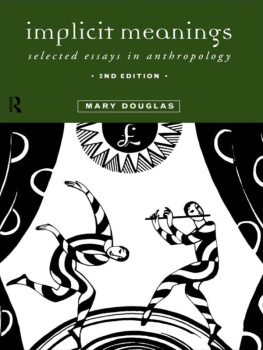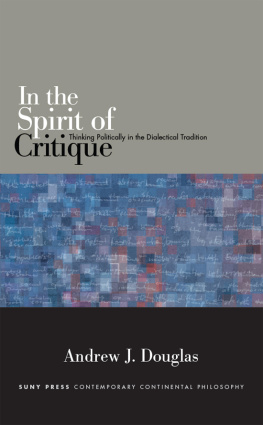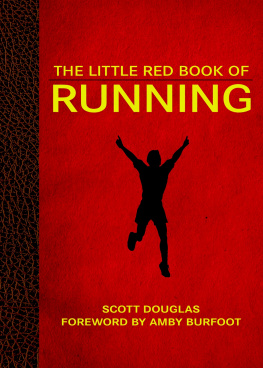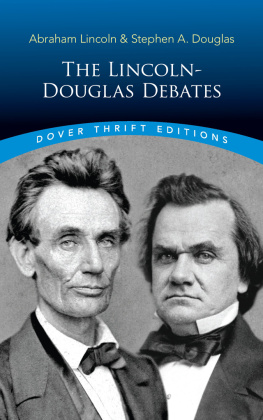Douglas - Implicit Meanings
Here you can read online Douglas - Implicit Meanings full text of the book (entire story) in english for free. Download pdf and epub, get meaning, cover and reviews about this ebook. year: 2011, publisher: Taylor & Francis (CAM), genre: Religion. Description of the work, (preface) as well as reviews are available. Best literature library LitArk.com created for fans of good reading and offers a wide selection of genres:
Romance novel
Science fiction
Adventure
Detective
Science
History
Home and family
Prose
Art
Politics
Computer
Non-fiction
Religion
Business
Children
Humor
Choose a favorite category and find really read worthwhile books. Enjoy immersion in the world of imagination, feel the emotions of the characters or learn something new for yourself, make an fascinating discovery.
Implicit Meanings: summary, description and annotation
We offer to read an annotation, description, summary or preface (depends on what the author of the book "Implicit Meanings" wrote himself). If you haven't found the necessary information about the book — write in the comments, we will try to find it.
Implicit Meanings — read online for free the complete book (whole text) full work
Below is the text of the book, divided by pages. System saving the place of the last page read, allows you to conveniently read the book "Implicit Meanings" online for free, without having to search again every time where you left off. Put a bookmark, and you can go to the page where you finished reading at any time.
Font size:
Interval:
Bookmark:

This new edition of a classic work provides an indispensable introduction to the thought of Mary Douglas.
First published to great acclaim in 1975, this second edition of Implicit Meanings includes a new introduction with Mary Douglass reflections on how her ideas have been taken up and how her own thinking has developed over the last forty years. Implicit Meanings includes writing on the key themes which are associated with Mary Douglass work and which have had a major influence on anthropological thought. Essays on animals, food, pollution, risk, joking, sorcery and myth derive from initial fieldwork experiences in Africa. In different ways, the essays probe beneath the surface meanings and seek to expose the implicit understandings which tend to be taken as unchallengeable. Mary Douglas has shown that anthropology can make a central contribution to debates in many academic disciplines, and can also illuminate everyday life.
Mary Douglas is a distinguished international anthropologist. She retired as Professor of Anthropology at University College London, and taught in the USA until 1988. Her books include Purity and Danger (1966), Natural Symbols (1970), The World ofGoods (1979), How Institutions Think (1986), and Risk and Blame (1992).
First published 1999 by Routledge
11 New Fetter Lane, London EC4P 4EE
Simultaneously published in the USA and Canada
by Routlegde
29 West 35th Street, New York, NY 10001
Routledge is an imprint of the Taylor & Francis Group
This edition published in the Taylor & Francis e-Library, 2001.
1975, 1978, 1999 Mary Douglas
Figures 3.1, 3.2, 19.1 and 19.2 were drawn by Pat Novy.
All rights reserved. No part of this book may be reprinted or reproduced or utilised in any form or by any electronic, mechanical, or other means, now known or hereafter invented, including photocopying and recording, or in any information storage or retrieval system, without permission in writing from the publishers.
British Library Cataloguing in Publication Data
A catalogue record for this book is available from the British Library
Library of Congress Cataloging in Publication Data
Douglas, Mary.
Implicit meanings: selected essays in anthropology/Mary Douglas. 2nd ed.
p.cm.
Includes bibliographical references.
1. Ethnology. I. Title.
GN304.D68 1999
301dc21 9919937
CIP
ISBN 0-415-20553-0 (hbk)
ISBN 0-415-20554-9 (pbk)
ISBN 0-203-02990-9 Master e-book ISBN
ISBN 0-203-04277-8 (Glassbook Format)
Starting to do anthropology, no one knows in advance where it is going. These essays mark where the first twenty years of that voyage took me. Anyone interested in belief, religion, and symbols looks to anthropology for insight. These essays are all either saying the same message, or providing some necessary background. The message is that it is useless to look for the meaning of a symbol, useless to take meanings one at a time, item by item, expecting to find something that will translate into our language. Meaning is part of a constructed world, the problem of understanding symbols is how to take a grip on a whole world. What is actually said in words is only the tip of the iceberg. The unspoken understandings are essential. How do we reach the implicit? By studying the classifications by which people decide if an action has been done well or badly, whether it is right or wrong. This is what these essays are saying.
There are two main justifications for anthropology. First is the imperative to make a full record of human society. That has little to do with disappearing cultures and much to do with the huge variety of ways of being human. Those who take on that project usually adopt an area, say the South Pacific, or India, China, or Japan, or the arctic circle, or west, south, east or central Africa, America, or wherever. They become regional experts and with like-minded colleagues they study the varieties of languages, agriculture, religion, and so on within their region.
Second, anthropology feeds the ambition to understand ourselves better by making comparisons with the rest of human kind call it the project to find meaning. The combination of the two projects gives anthropology its distinctive outlook. Accepting the peculiar stress entailed by that vocation, the major challenge is for the regional specialists to deal with their own prejudice and bias. Somehow they must avoid interpreting everything through local Western lenses. The vast compass of comparisons creates the strain. It is never good enough to say that these other people think differently from us because they are different. Instead of exempting ourselves from the scrutiny, anthropology puts ourselves under it and turns local questions into universal ones. By the comparisons we put ourselves on the line. The anthropologist has to be daring. There must be empathy.
This book follows the second project. Its object is to find meanings. Its method is to universalise foreign and strange beliefs until what seemed at first to be inexplicable is eventually absorbed into our own enlarged experience. To examine the implicit it is necessary to go below beliefs that can be made explicit and to watch how submerged ideas determine action. For example, the idea that dirt is dangerous is mostly implicit. Taboo, for example, has a place in a general idea about forbidden behaviour as the cause of illness. Sink it back into a wider set of ideas and you find a common theory that moral failure causes bodily afflictions. Anthropologists sometimes talk about the problem of belief, but beliefs only generate problems when there is disbelief. It is no easier to suspend the one or the other. Belief is a matter of how worlds are constructed, not a matter of personal idiosyncracy. Consider, for example, the conflict between African belief in the dangerousness of sorcerers, and English disbelief. How can people communicate at all when their worlds are built upon such grave discrepancies?
The book has three parts. The first approaches the idea of the implicit by examining ideas which underprop action. The essays in the first section are about the Lele of the Kasai, a people in the Congo among whom I did my fieldwork training. Outsiders to the profession are often witty at the expense of anthropologists fieldwork, as if it were a ritual requirement, an entry fee. They speak of it as a traditional ceremony of initiation which has taken this form fortuitously; strictly speaking it is unnecessary, anyone who wants to do anthropology without fieldwork will be none the worse. But whoever has the patience to read this first part and go on further will recognise how strongly the Lele themselves have shaped my professional judgment. A writer or traveller who has not been through it, may find it hard to imagine fieldwork as the source of creative understanding. But I think that this effect of prolonged and intense experience is common to most anthropologists.
The second part lets the esoteric African case histories lead into discussing other anthropologists interpretations. So this is where essays on the structuralist interpretation of myth and ritual belong. Familiar problems of interpretation get their universalising and systematising treatment. Laughter, for example: is it the same thing from one period or place to another? Everyone thinks they know why they laugh and most can recognise a joke. But it is more difficult to say what makes a joke funny. Why do people insult each other and then laugh? Do animals laugh, or is laughter a uniquely human gift? To all these miscellaneous questions I find myself preparing the same general answer. The questions should not be asked as if individuals are non-social beings who laugh and worry on their own: they are social beings who live together, and who collectively shape each others fears and laughter in standard ways. They act on beliefs they have collectively made. A theory of bodily behaviour is implicit here. The body turns out to be responding sensitively to the society, even the amount of movement that it can use, and the amount of signalling it is supposed to do is regulated. Therefore, if we want to understand symbols, we have to work out some way of comparing collective behaviour.
Font size:
Interval:
Bookmark:
Similar books «Implicit Meanings»
Look at similar books to Implicit Meanings. We have selected literature similar in name and meaning in the hope of providing readers with more options to find new, interesting, not yet read works.
Discussion, reviews of the book Implicit Meanings and just readers' own opinions. Leave your comments, write what you think about the work, its meaning or the main characters. Specify what exactly you liked and what you didn't like, and why you think so.















